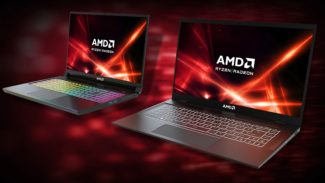At Computex AMD announced three new graphics chips for laptops, using its latest RDNA 2 architecture.
AMD says this RX 6000M series delivers up to 50% higher performance or 43% less power at the same performance, compared to the prior RX 5000M series.
| Product | Compute Units | GDDR6 VRAM | Memory Bus | Infinity Cache | Target TDP |
| RX 6600M | 28 | 8 GB | 128-bit | 32 MB | 50-100W |
| RX 6700M | 36 | 10 GB | 160-bit | 80 MB | 80-135W |
| RX 6800M | 40 | 12 GB | 192-bit | 96 MB | 145W+ |
As with the desktop RDNA2 chips announced last year the RX 6000M series adds extremely low latency CPU-like ‘AMD Infinity Cache’, as well as support for hardware accelerated raytracing.
There are no independent benchmarks available yet, but AMD did show slides comparing to NVIDIA’s latest laptop GPUs in popular non-VR titles like Assassin’s Creed Valhalla and Call of Duty.


These slides, presented by AMD, suggest RX 6600M is roughly on par with NVIDIA’s mobile RTX 3060, and RX 6800M is roughly on par with NVIDIA’s mobile RTX 3080.
When using an Oculus Quest as a PC VR headset, your GPU doesn’t just send frames raw. Because WiFi and USB have considerably less bandwidth than DisplayPort, the video stream is compressed using the GPU’s built-in video encoder. Virtual Desktop developer Guy Godin told us the video encoder in AMD’s cards has both higher latency and worse image quality than NVIDIA’s. We’ve heard this from Oculus Link users too. We don’t know whether this is solved or improved in RDNA2, so if you’re planning on using one with a Quest we’d recommend waiting for someone to test.
AMD also announced FidelityFX Super Resolution (FSR), a machine learning based real-time upscaling system similar to NVIDIA’s DLSS. Interestingly, AMD says FSR is open source & will work on competitor hardware. There’s no word yet on whether FSR supports VR.
RX 6000M series will ship in laptops starting this month, from popular brands like HP Omen, Asus ROG, MSI, and Lenovo Legion. AMD will certify some as ‘AMD Advantage’: models paired with a high performance AMD CPU, high refresh rate FreeSync Premium display, fast NVMe storage, long battery life, and “custom tuned thermals”.





